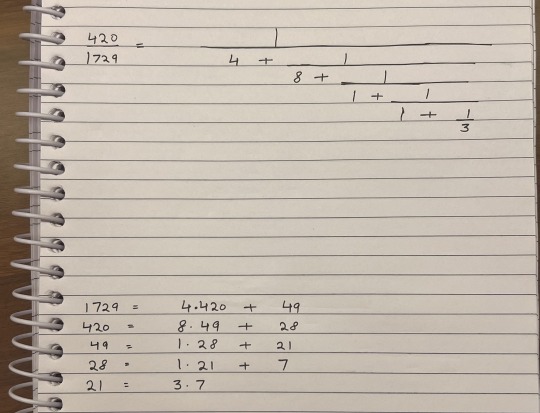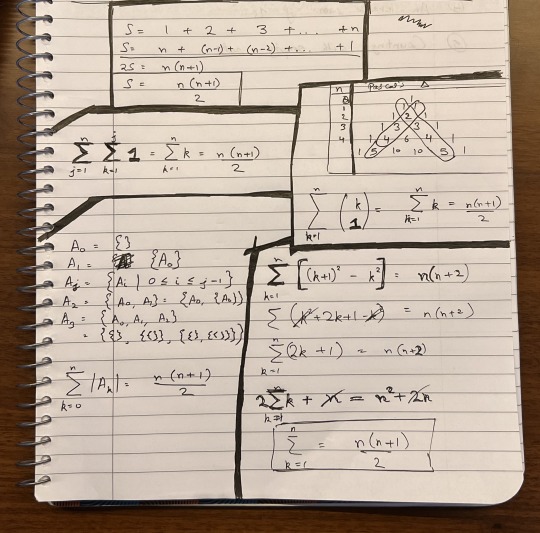Text
Math Doodle #3: Proving Divisibility Tests
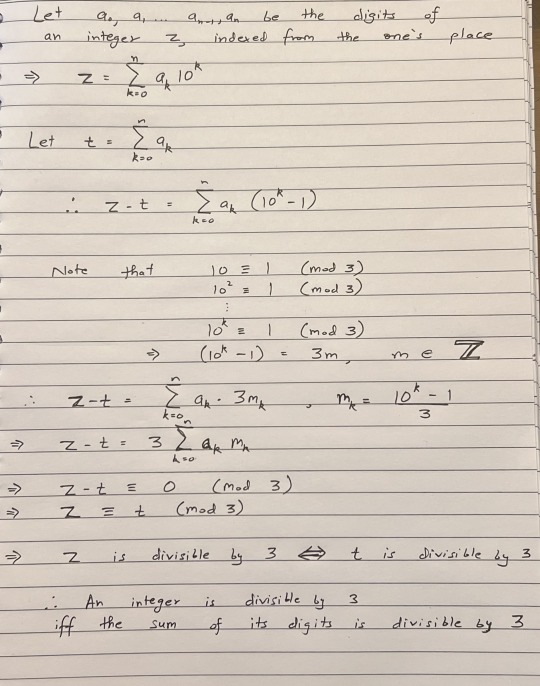
0 notes
Text
Some Reflections on Faith
A very close friend of mine is undergoing surgery this week. Being ill is never easy (I get existential every time I have a bad cold), but being seriously ill is a different thing. The whole experience is clouded with pain and uncertainty. It's uncomfortable to talk about it in an ongoing sense. You can detach yourselves from the past, and you can abstract away the future possibilities of age and illness, but in the now, all of this... it is unbearably heavy. Even as a witness standing at an arm's distance, I feel its weight radiating on me.
This brought me to the idea of God: people pray for health, for wealth, for hope.
...
I am not a "believer". I have been an atheist for as long as I can recall (although I have prayed during the occasional rock bottom life crisis). I do enjoy going to the gurdwara, but that's mostly for the prashad (halwa! in desi ghee!). Of all the religions I have witnessed, Sikhism and Buddhism are probably the most palatable ones, although I am sure there exist extreme forms of these as well. Even the most palatable ones have not converted me into a believer - I remain tolerant, but that's about as far as I have been able to go.
My relationship with God has always been strained. Even as a child, I don't think I really could believe. It was never a matter of choice - I just couldn't convince myself of those ideas. Instead, my early years were dotted with encounters that lean closer to "spirituality". I had a 4th grade teacher who introduced us to meditation and the idea of 'manifestation' (looking back, this is surprising - ideas of this form were considered very exotic back in 2010). I didn't (and still don't) consider these to be incompatible with atheism, but I no longer believe in these (I do advocate meditation, but not the manifestation kind).
It was a bit later that I claimed my (anti) religious identity of being an atheist. And until college, its tenets remained largely unchanged: that there is no proof of the existence of a higher being, and that phenomenon with no known explanations are not valid proof to support the existence of any supernatural entity.
...
In college, as I was exposed to a more abstract level of thought, my perspective began to shift. My beliefs remained largely static, in that I remained an atheist, but the lens through which I saw this problem changed entirely. Rather than fixating on the idea of religion and God as propositions to be evaluated, I became interested in religion as a part of the social fabric and the human experience. This shift simmered silently in me until it found its reflection in the outside world: here's a video by a fairly famous biologist at Stanford painting a tiny partial picture of what's called the cognitive science of religion.
But beyond understanding why religion evolved across nearly all known human cultures, there is... not much to it. Science is not a substitute for religion. Being religious has health benefits, but understanding that "being religious has health benefits" does not itself have any health benefits (maybe it makes you smarter, and that makes you richer, and I'm sure being rich has health benefits). It makes for better conversations, and hopefully a kinder attitude towards fellow religious friends and family members. I concede that.
...
It's only over the last two years that I've had a glimpse of the chaos that is woven into the fabric of the world. And in face of this chaos, I find my atheism too cold and rigid. "Chaos" is quite abstract. This is not the place for a lengthy illustration of my own experience of it, but it's enough to say that this has been a period punctuated with uncertainty, with relationships straining and expanding, with my sense of self and purpose and work ebbing and flowing, moving in different directions at different times. There is no pattern to the chaos when you are in it.
Ultimately, there's a lot of uncertainty and a lot of pain in life, and there's not a very clear reason for a lot of it. I'm sure that some doctor could explain why a lump formed on my friend's rib cage. They could very well explain why my mother's knees have started hurting suddenly and why they will likely stay this way now. But the anatomical or biological explanation is just a part of the whole picture. In the final analysis, it is not clear why we have to suffer through so much uncertainty and pain in the first place. It's the problem of finding meaning in a meaningless world (that is, if you concede it is meaningless in the first place).
...
I find myself going back to two chants that are quite different in essence. They offer me some comfort without imposing (m)any magical ideas on me.
youtube
youtube
2 notes
·
View notes
Text
Math Doodle #1: Logs, Intuition and Approximations
Shortly after sharing Math Doodle #0, I played around a bit more with the expansion of ln(1+x). In particular, I wanted to see if I could use it to find ln(3) or ln(5) [Spoiler: you can't, but you can]. That lead me to think more generally about logarithms and why my intuition for them is so poor. I consider myself math-savvy, and within the little math I know, I know it fairly well, so I set out to see if I can improve my intuition for calculating logarithms.
I spent considerable time thinking first about those transformations over which I am able to reason intuitively (linear equations, quadratics, squares). My first hunch was that, a prerequisite for this instinct might be convenience: these tend to be continuous monotonic transformations (well, not entirely - but squaring is almost a monotonic transformation, or at least, the change in rate of change is conveniently placed at x = 0).
Logarithms, despite being continuous and monotonic, offer very little in the way of similar intuition. I attempted to tighten the bounds - so if log_2 maps [128, 256) -> [7, 8), can we partition these and come up with maps of finer resolution, without doing a lot of involved calculations? A little bit. {Hint: log_2 maps [128, 128*(2^0.5)) -> [7, 7.5) approximately}, but not too useful.
All of this made me go back to the transformations I considered initially. It made me realize that I am able to claim intuition for those only under very specific conditions - I know how the squaring transformation behaves, but intuition about its behavior does not help me compute large squares, or invert them. So there is, in a way, a difference to note - intuition about the behavior of a transformation, and intuition about the cold hard calculation of a transformation.
Trivia: Interestingly, the history of logarithms shows that the initial motivation for them came from their ability to simplify other arithmetic calculations: multiplying numbers with many digits is quite tedious, and logarithms offered a way out. They did rely on logarithm tables for this, though.
Circling back to the opening of this post, I tried to see if I could use the Taylor expansion of ln(1 + x) derived in Math Doodle #0 to get some bigger logarithms. By direct substitution, that's not possible, and that's quite expected: the series diverges for all |x| > 1 (this condition can be derived from the convergence test for alternating series).
However, I found a neat trick that allows one to use this expansion for an arbitrary positive integer k. Of course, this gets tedious quickly for large values of k, but that it can be expressed so succinctly is still beautiful.
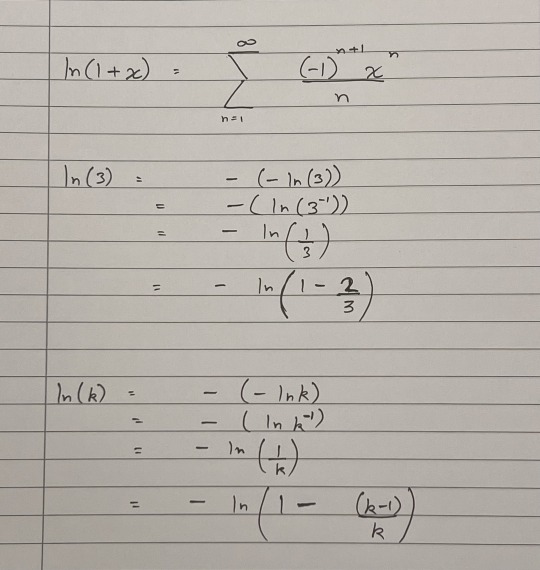
0 notes
Text
Math Doodle #0: Alternating Harmonic Series
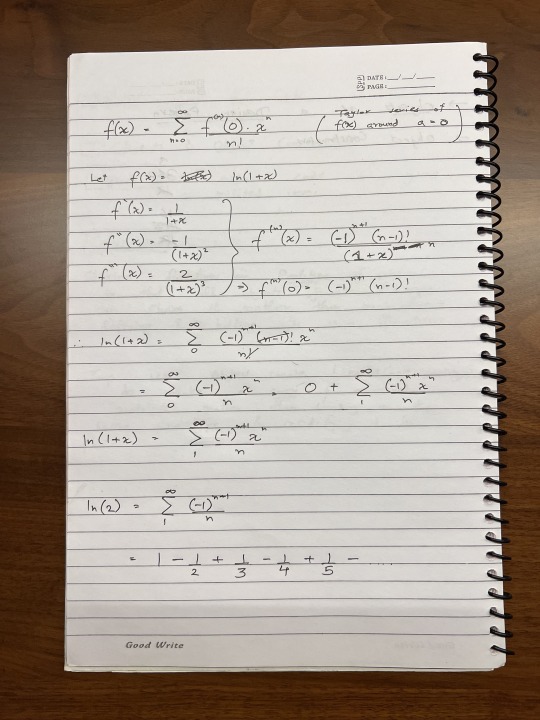
0 notes
Text
A Summer of Idleness
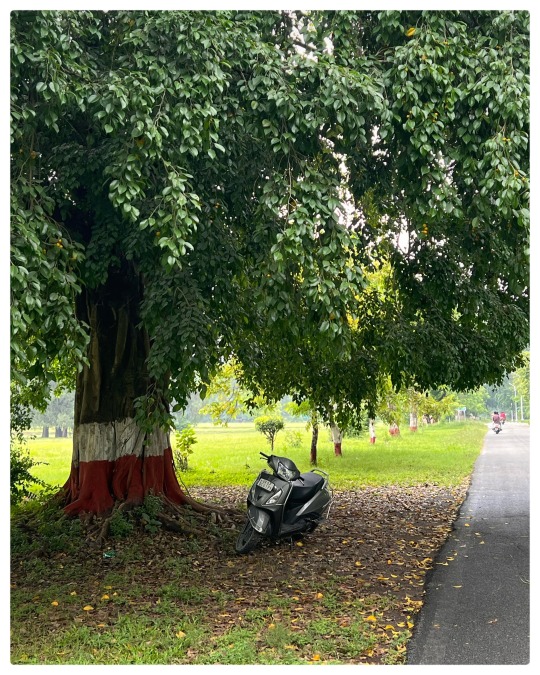
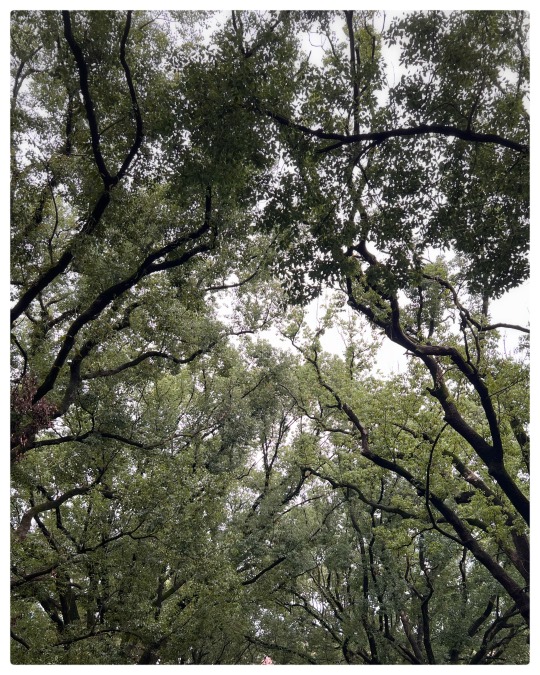
There is a sense of growing familiarity with this city (Dehradun), which I want to call the first that I've built on my own. I have been here thrice this year, each time by myself, each time to see Aastha; but secretly, these visits have taken on their own shape - a purpose that's tethered to this relationship, surely, but stretches beyond it as well. It's a tiny glimpse of a life that's not dictated by the family clock and calendar anymore.
....
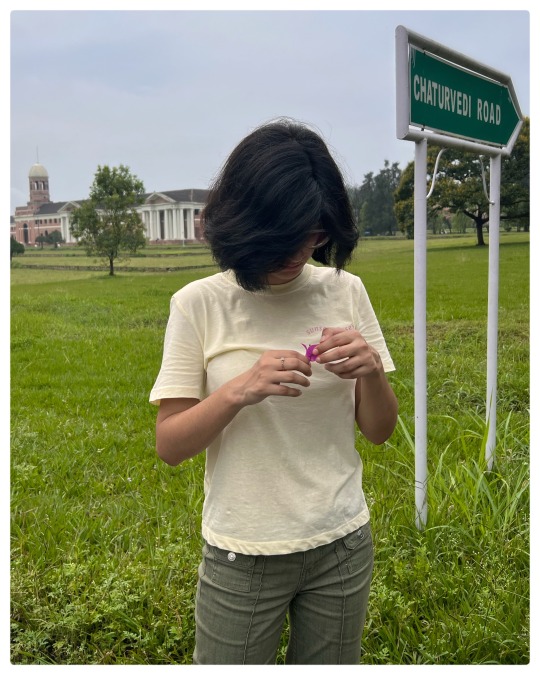
You see, I have never really lived away from home. Still, there are places here where I peek into the possibility of a life that would have much more of me and much less of my family. Perhaps I am too harsh a critic of them. I was rereading an older write-up of mine, and in my words I saw an appreciation for them that today feels very distant. It is not easy, to forgive your parents, and to be grateful for them, all at once. There are many things I wish they had done differently. Lately, it is harder to be grateful. The gap between us widens with every decision I make, to do things differently than they did. And I see them stretching for me, to make sense of how I live and try to support it, too. Most days, I am not very perceptive of these efforts they make. But on the days I am perceptive, their efforts are astonishing.
....
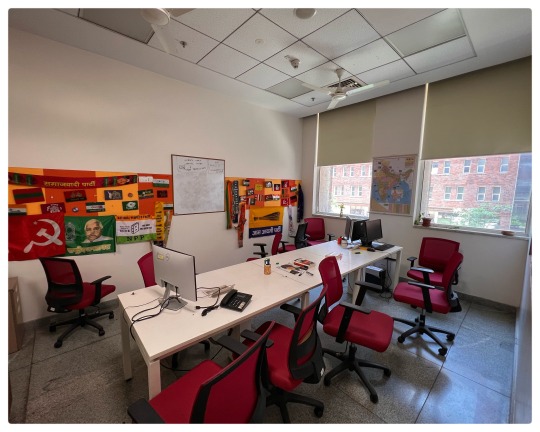
I quit my first job 8 weeks ago, and I've had a lot of free time on my hands since then. I am not used to it. Staying busy is easier. But my idea of success is freedom. And freedom seems like a distant dream unless you sit down to take stock of who you are and what you want. A singular focus can get you further faster, I don't doubt that. These meanderings, these periods of reflection and idleness - they slow me down, but (I hope) they make space for being deliberate with my time here. And without that, can one really be free? There are constraints beyond the ones that occupy the centre stage of our worldly affairs. Perhaps such a thought can only bloom on the soil of privilege.
....
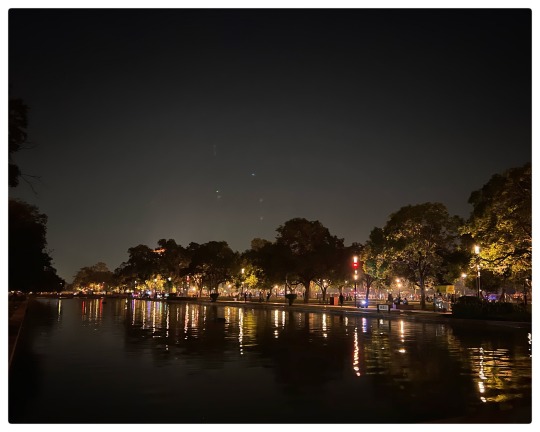
This particular period of idleness and reflection, it has inside it a feeling of... marvel. I have come a long way. And the funny part is, for all my rambling of purpose and deliberation, the outcome is not something whose shape or texture I could have imagined. And then, I wonder, to what means am I defining my purpose, when I cannot even conjure a vague image of the future it leads me to? I have been lazy lately! This is the laziest I have been in a long time. And yet, still, in that laziness, there is purpose. And within that laziness, I carve pockets of work, which have purpose. Purpose without goal, purpose without an endgame. Purpose as devotion to a set of ideals that I hold close to me - to try, to keep trying, to try harder.
0 notes
Text
Dreams of Coherence

This is a picture from two years ago, give or take a week.
A day after the first lockdown, I lay down a sheet of newspaper and kneeled on the floor. I ran a trimmer across my scalp and watched my hair fall to the floor - thick, dry clumps at first, and then smaller strands, growing smaller with each subsequent run. It had been a desire of mine for many years, to have nearly no hair - I had always imagined it would be a cool and liberating feeling. And it was. That joy lasted about a couple of weeks. I let that wreck grow out for the next 19 months, measuring it over time by how far the strands would fall on my face - my nose, my lips, my chin, all serving as different milestones in that tedious process. For the first time in my life, I watched the ends curl into spirals that eventually reached my shoulders.
19 months later, I went back to being myself.
…
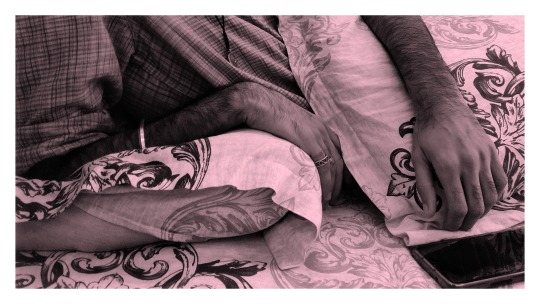
In the cupboard next to my wardrobe, I store memorabilia. I keep it locked away from prying eyes. On the lower shelf, there are 4 shoeboxes arranged in two piles. These shoeboxes serve as my personal metric of time - two of these are from school, the third one is labelled “2016-18 AB”, and the last one has no label yet. These shoeboxes are filled with movie tickets, bus tickets, plane tickets, tickets to museums - all kinds of tickets stamped with fading ink. There are gifts and letters here from friends, friends from friendships and events in time, that only exist in memories which I keep alone, which is just another way of saying - I am not entirely sure anymore if these events even happened at all. For the last 7 years, I’ve journaled inconsistently. My recollections are spread across 3 notebooks, two of which are finished, and one which I still pick up to write in from time to time. I find it hard to relate to the person who decided to store these things in this manner. I don’t re-read old journal entries, nor open these shoeboxes to take out old tokens or store new ones.
This is an archive with no visitors.
…
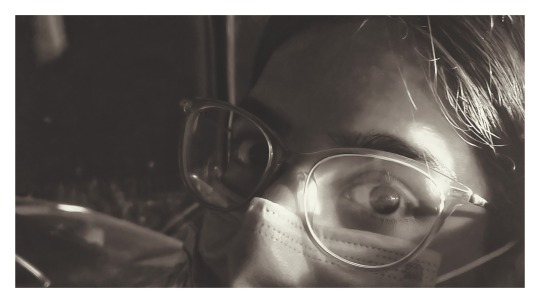
As I walked with you through the arched corridors of the Qutub complex, I felt a strange sense of familiarity. When we walked in, I told you I had never been here before, but now I must confess, I am not so sure. You’ve been away a whole year, and I am re-learning what it is like to be around you. Would it be okay if I told you that I have been here before? My father says it is a blessing to have a short memory, but sometimes, I think I remember much more than I allow myself to admit. I empty my head out into shoeboxes, slap a label on them and push them into dark corners where I don’t have to see them again. But you see, I have been here before.
…
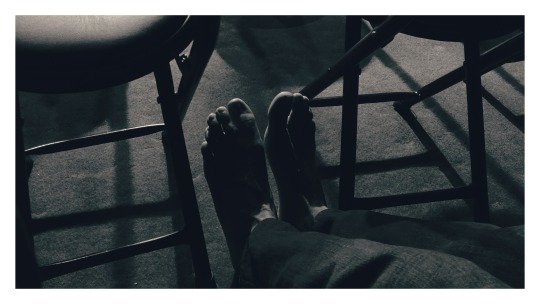
“27th March, 2020
10:45pm
I’m having to put multiple entries on one page because I’m nearly finished with this diary, and there is no telling when I will be able to get my hands on a new one.
(Ayn) Rand writes how an organism’s most basic way of distinguishing between right and wrong is through physical sensations of pleasure and pain. What higher organisms (i.e, humans) have is the ability to ‘perceive’ by retaining sets of these sensations and formation associations with them. But to live with anxiety is to grow a distrust of your own self. With anxiety, the world is a minefield, eggshells around eggshells. To function, one must numb or silence that voice out. I have grown to disobey, to discard, to do despite, and sometimes, even to do because of; and perhaps, this is the most natural culmination of that process - becoming a person who cannot tell right from wrong because they cannot rely on the sensations of pain and pleasure to navigate this world.”
…
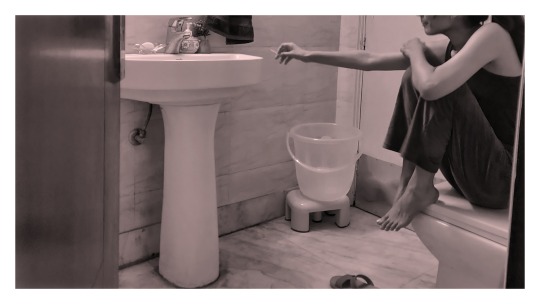
And what happens when you refuse to remember yourself? I find myself locked in with mirrors that cut across time to bring back these fragments I have so forcefully amputated. And I see my own reflection. I see my disfigured body, that dent in my chest, tiny strands of hair sprouting on the surface of my nose. I see myself dressed in dead people’s clothes, the lingering scent of habits I picked up from friends and friendships that now exist only in memories, memories which I keep alone.
You see, I am not clean, and no amount of cleaning would get me closer to starting fresh.
0 notes
Text
Monkey Bars

I could never jump across monkey bars as a kid.
My lanky arms allowed me to get across to the second bar without letting the first one go. The trouble was getting to the third one. I could not establish a firm grip on the third bar while holding on to the second - at best, I could brush my fingers against it, the metal burning hot after an afternoon under the summer sun. To get across, I had to take a leap of faith. I’d have to swing, and then, I’d have to let go. There would be a moment between holding on to bar two and grappling bar three, a moment when I would be doing neither of those two things. In that moment, there would be a small chance that I would not make it across, that the metal would slip away from my clammy hands. No, I have never been able to deal with that kind of uncertainty.
The playground is empty this morning. The metal is glistening under the sun, reflecting the morning dew resting on the rusty swings - yellow, red, pink, green, the preschool colour palette with patches of grey where the paint has worn off, and elsewhere, mounds of rust. The weather isn’t particularly chilly but a thin jacket would’ve been nice. I feel my ankles tugging at my calves - cramping from the cold, cramping from the thought of cramping, cramping in anticipation of the gruelling marathon (my first) that they will be running later today.
I started running a few years ago, when I was in college. Avi had suggested it - he was annoyed at the sound of my feet pacing around the house all day. He’d ask me why I kept walking around, and I told him, I couldn’t sit and think. We started with a “eh, okay, let’s give it a shot”, and eventually, we started to enjoy running. So much so that on the weekends, we’d drive to this quiet part of the city and run west on a narrow trail cutting across this dense forest. The trail led to a barren flatland - barren, except for the odd patch of grass here and there, and flat, except for an arrangement of boulders. Provided that the rocks weren’t too hot from the day’s sun, we would climb the boulders and sit at the top. There was the city airport, before which there was a highway, and just before that, the barren flatland with the set of boulders, and on top of them, Avi and I. We would spend those evenings being distant witnesses to the drama of cars scrambling across the highway and the screeching cry of aeroplane engines.
How do you answer when somebody asks, “What are you thinking about?”
The good thing about Avi is that he doesn’t ask those questions. I think he wants to know though.
The bad thing about Avi is that he’s particular, to the point of being obsessive. The good thing is that he’s not one to lose his temper. So when I walk back home with white eggs instead of brown, I expect him to skip eggs and just eat a cheese sandwich.
Instead, he throws a fit about it.
The good thing about Avi is that he’s predictable. The bad part is that despite this, I cannot be certain about his emotional response to the wrong kind of eggs. What nobody tells you about living with another person is that it’s a lot like being married - sometimes, you fight about things that don’t matter because of your inability to fight about things that matter. In this way, Avi reminds me of my mother - after all, they’re the same zodiac sign, born 31 years, 11 months and 8 days apart.
My greatest fear is to end up exactly like my parents. Living with Avi can be a gay recreation of that nightmare.
But the nightmare is not complete yet. When the horror is external, at the very least you can run from it, but how do you run from mirrors? They’re everywhere. My reflection carries a trace of my father - we share a bald spot on the left side of our foreheads and a paunch that’s popping right out (in my defense, I’m not fat - I just have bad posture). Some nights, when I’m doing the dishes after dinner, I feel like carving my nose out of my face and replacing it with the soap soaked sponge - maybe then I’d look less like him. But I talk like him, my mother says. Can I wash his words off my tongue?
Now I taste toothpaste.
When Avi is screaming at me about the eggs, I think about bubble blowers. I imagine our apartment is filled with pink bubbles, bubbles that fall to the ground and rub against the marble. Bubbles and foam that collect in my mouth. Bubbles and foam are choking me now.
Spit.
When Avi is screaming at me about the eggs, my mind is unable to connect eggs and anger - it feels like this is about something more. I think he’s been unhappy, but I’m not really sure. His mother came to live with us for a week last year when we were having a bad phase, and she left her copy of this book about love languages. I read it.
I found out that Avi’s love language is quality time. The last time he seemed really happy was a couple of weeks ago, when we drove down to the bakery and ate croissants there rather than getting them packed for home - he says there’s something about the aroma of the place that makes him feel warm and nostalgic. I really like going there too, but that’s because of this cute girl who works there.
When he stops screaming, I suggest a trip to the bakery. He looks at me silently.
Is he even there anymore? Absence can coexist with physical proximity. My father taught me that.
The thing about living with someone is that eventually, their silence becomes interpretable.
But I’ve always liked the quiet. And so, really, this is an annoyance - it’s not true silence if the tension is palpable. I’d much rather he get it all out at once, but he’s not like that at all. The outburst is a temporary crack in the veneer of his composure - forgotten quickly, instantly, just leaving behind a trace of frustration in the room, like the aroma of burnt sugar that makes my nose all itchy. I feel a sneeze tickling my nasal passage, but it just won’t come out. I wish I could sneeze at will - it’s such a satisfying release.
Instead, I massage my calves and eat a banana.
⁓
Initially, when I started running, it would feel like I was choking on air. The body adapts quickly though. Running is not a mechanically complex task - in essence, you are just putting one foot ahead of the other, one monkey bar after another. But it takes more than just crude stamina to run a marathon - you need a pace that can last the distance. The pace decides not just your movement but your breath too. Too slow or too fast, and running stops being fun. There’s no constant answer to the question of pace either - it has to adapt with the gradient, the weather, and the mood. That adjustment process becomes natural after a certain amount of practice. It is sufficiently natural to me now, so when I hear “go” at the marathon, I start hopping. Within a minute, I’m gliding across the asphalt.
What is the relationship between the mind and the body? It’s impossible for me to sit and think.
At the 7th kilometre mark, I see someone throwing up. Marathons are not for everyone.
This one time, I tried to swing across the second bar to the third one. I fell. I didn’t try after that.
At the 11th kilometre mark, I am more sweat than skin.
I have this memory from my childhood. On winter mornings, my father would drive me to school. It used to be so cold, we’d wrap our hands in gloves, rubbing and blowing to keep them warm. On the route, we would spot an old man. His face was wrinkled, like a raisin - he was significantly old, maybe older than me and my dad put together. He’d be running in just a vest and shorts, with beads of sweat trickling down his face, all trickling across different paths, all headed for his vest.
Maybe one could make salt from his flesh on those winter mornings.
Maybe one could make salt from my flesh right now.
The relationship between the mind and the body is a codependent one.
At the 19th kilometre mark, the sky is no longer blue - it has morphed into a shade of yellow and orange, with the sun resting on the horizon, bleeding streaks of crimson. At this point, I am no longer running. I am my 15 year old self on a beach.
The water is warm from the summer day, and the waves strike against my chest, rising to my chin, then falling back down. I am my 15 year old self, floating in the warm salty ocean of sweat while looking at the most beautiful sunset that I have ever seen. I hear my mother’s terrified shrill cry. She’s standing at the shore, ordering me to not go deeper into the ocean. She doesn’t know how to swim, but I do.
I am my 5 year old self, jumping across monkey bars. I hear the same shrill cry as the metal slips away from my hands. Pothole. I nearly stumble onto the asphalt. I hear the same shrill cry. Fear is my inheritance. Can I abandon it now?
At the 23rd kilometre mark, I feel a strong impulse to leave everything behind and run away.
At the 27th kilometre mark, I am sliding downhill. The sun has set and my sweat has dried. I spread my arms across, and now, I am a bird. I stretch my palm wide - my fingers slice through the breeze, breathing life into the folds of my hands.
The relationship between the mind and the body is a symbiotic one. The thing about running is that it’s the only time when my mind and my body are in sync with each other.
At the 31st kilometre mark, I am wondering why I have never spoken to the girl who works at the bakery.
At the 34th kilometre mark, I am thinking about Avi.
The thing about monkey bars is that there are two ways to get across. You can jump all the way through or climb the top and crawl. My problem is that neither of those work for me.
Sometimes, when Avi talks to me, I get the feeling that we are not speaking the same language. Of course, syntactically and for all meaningful purposes, we speak the same language, but is that sufficient to say it is the same language, when we don’t even understand each other?
Sometimes, I feel like I’m still living with my parents.
You can prepare for every aspect of a marathon except what comes after the 36th kilometre mark.
At the 36th kilometre mark, I am thirsty and 5 minutes past the last water stop on the circuit.
Each metre beyond the 36th kilometre mark is a needle piercing through the rubber sole of my running shoes.
Is feeling thirsty the same as needing water? The ascetic must say no. The runner must say no.
Is feeling thirsty the same as needing water? I am my 14 year old self, my cupped hands pressed against my lips as my mother pours jal into my palm. I was raised on a diet of positive affirmations, of new age spirituality mixed with ancient religion. I am my 14 year old self, a witness to my mother’s pretense - “everything is okay”, she murmurs under her breath.
Sometimes, I feel that she is telling me lies that she does not believe.
Where is the line between instinct and intellect? I know I mustn’t drink more water, but my body is begging for it now. The problem with lines is that I don’t know where to draw them - now I am my 17 year old self watching my mother pace around the house. “Nothing is okay”, she says. Has it ever been okay?
The difficult part is acknowledging that okay and not-okay are not mutually exclusive states of being. The problem is the illusion of danger doesn’t look very different from danger itself.
Is feeling thirsty the same as needing water? The reason I run but don’t pray is because running doesn’t pretend to ascribe greater meaning to deprivation and suffering - it’s just a way of getting across. Marathons don’t pretend to end at the doorstep of some divine reward.
The last thing you want when you’re soaked in sweat is for a pigeon to shit on you. Then you run your hand through your hair and feel something sticky inside it.
The greatest hurdle of a marathon is the 36th kilometre mark. It is your parched throat begging for water. Everything new is uncomfortable, unfamiliar, unknown, uncertain. Everything new is a needle piercing through the rubber sole of my running shoes.
The thing about pain is that it cannot be ignored.
The thing about running marathons is that pain must be ignored.
But what is pain? Pain is a signal in your head. From an evolutionary perspective, pain facilitates survival, but to run a marathon, I have to numb the signal out. I have to ignore it, go on despite it. This requires training. You cannot run a marathon without this. All training is an unlearning of natural instinct.
There is a loud ugly man inside my head, I murmur to myself.
The loud ugly man wants things a certain way - easy, comfortable, familiar, certain.
When I deviate from that, the loud ugly man makes my heart race and my head spin.
The loud ugly man is my father’s absence.
The loud ugly man is my mother’s cry.
The 36th kilometre is my enlightenment. “Everything is okay”, I murmur to myself.
Running is not so different from jumping across monkey bars. Once you figure out how to get from the second to the third, the rest comes naturally. Somewhere between the 36th kilometre mark and the end, I tell myself I’m going to go back to those monkey bars and try to do them all the way this time. Then I remember, that’s not possible anymore - now, my folded feet touch the ground.
⁓
Latch on.
Rubbing my eyes, I gag from the stench of human flesh marinated in salt. I really should’ve showered before sleeping. The fridge has a fresh stock of brown eggs, and the living room has a trail of blood droplets that encircle the sofa.
“I cut myself while clipping my nose hair.”
Swing.
I sit down next to Avi while he’s pressing the ice-wrapped-in-cloth against his nose. His eyes look glassy, like he’s holding in a sneeze. I hope he doesn’t sneeze blood on me.
“Do you want to go to the bakery aaj shaam ko?”
“Chalo.”
— (Artwork by Aditi Gupta)
3 notes
·
View notes
Text
The Great Divide
The label of ‘intellectual’ in today’s world carries within it the idea that they are people who shift from theory to theory, as required, to justify any stand they wish to take at a given point of time. It divorces the idea of intelligence from its practical manifestation, but it does not stop there. It comes around, in a circle, to prove that there is no one intelligent at all — that the intelligent are simply those who have learnt to weaponize language to create an illusion of legitimacy for the ideas that they would like to propagate. In other words, in today's larger culture, intelligence is viewed as merely a tool to offer legitimacy to a particular kind of propaganda. Facts as they are defined no longer exist; they have been substituted by data, numbers, statistics - figures whose meaning morphs depending on how you see them, with an absolute lens or a relative one. Instead of facts, we now find irreconcilable narratives, narratives whose legitimacy depends upon its appeal to existing views.
Depending upon which end of the spectrum you find some comfort in, you will find that the answer given to explain this polarization is the same regardless of your politics. The answer is to make a ‘rational’ appeal to the definition of the intellectual provided at the beginning of this piece. It begins by planting a seed of doubt, of suspicion towards the ‘other’, to make the claim that instead of their politics having a basis in rational argument, they have simply chosen the argument that is most aligned with what they already believe to be true.
This line of argumentation can lead to an infinite and irreconcilable chain. In so far as there is no objective criteria to determine right from wrong, true from false, in so far as knowing has become impossible, the dialectical method fails because it becomes possible to question each agent and make the same claim against them that has been made above - to each argument, this counter argument is applicable, and for each counter argument, this is a valid counter-counter argument.
At the heart of it, this is an ‘ad hominem’ argument - a digression takes place, shifting the focus from the claims to the person making those claims, to discredit the legitimacy of their argument. It is considered to be a fallacious argument, and on the surface, it seems to be, but there is more to say about this. Outside the framework of ‘legitimacy’ of arguments, one must recognize the importance of stating the identity of the people making these claims. To pretend otherwise is to detach the political from the personal - no logic is based on some truth that is removed from who we are as people. Our inclinations towards certain premises stem from our lived experiences, and one can debate over the validity of these premises but one cannot debate over another’s lived experiences - you have not lived my life, and I have not lived yours. This is not an original idea - these are postmodernist ideas, and I believe what we see today is an incomplete, inhuman culmination of the same line of thought.
A curious fact of this situation is that while the argument described above equally applies to ‘us’ as well, it seems to be used selectively only against the ‘other’ - this is true, regardless of your politics. We are witnessing, at large, unprecedented polarization - perhaps it seems unprecedented only because today we have the ability to curate our media consumption like never before. For all its promise of ‘connecting’ the world, social media seems to lend itself better to fragmentation - society is breaking up into clusters of like minded individuals, and while people within these clusters continue to grow closer, these clusters are moving further apart. We consume the news we want to consume and talk to people who share our political views, and we do not allow ourselves to be challenged. For the select few who continue to expend energy on challenging and being challenged, these arguments often seem to end with a diplomatic and unsatisfying note - “I respect your view, you have every right to believe that.” The sentence implicitly carries a refusal to budge - it is the representation of surrender to an inertia that even the best of us carry, an expression of the fact that we have either failed to convince or be convinced - either way, it did not matter. It appears that even for those who value discourse, discourse has become fruitless.
While we have developed a crude understanding of the role of individuals in polarization, there is another generalized (incomplete) perspective to understand what is happening. For this, it is important to become familiar with two related ideas - the paradox of tolerance, and the horseshoe theory.
The paradox of tolerance states that in order to maintain a tolerant society, the society must be intolerant of intolerance. The argument underlying this idea is even more confusing than the statement above, but the essence is what matters - a group protects its existence by being intolerant to the ideas that threaten it. The degree to which it is tolerant (or intolerant) may vary, but it holds true for all social groups - to exist, we must struggle against that which threatens our existence. The horseshoe theory states that far-left and far-right behave like two ends of a horseshoe bending towards each other - even though they technically lie at opposite ends of the spectrum they closely resemble one another, particularly in their authoritative and totalitarian tendencies . In essence, this supports the idea we arrived at from the paradox of tolerance - in so far as a particular ideology, movement or group is concerned, there is a strong tendency to respond to criticism or opposition by refusing to entertain it in any serious capacity, simply because these serve as a threat to the existence of the group itself. From this, it may seem like polarization is an unavoidable and natural consequence of the existence of groups with opposing ideas. I reject this - instead, I hold that polarization is a consequence of the existence of groups with opposing ideas only if its members claim membership by attaching themselves to the underlying ideas. Perhaps it is not possible to remain in a constant state of flux with regard to beliefs, but the higher the degree to which a group avoids criticism, the closer that group tends towards becoming a cult.
The limitation of this piece is its inability to find any substantial or useful answers. I don’t have those, but I have a partial one, my own. A useful tool in bridging the extensive gaps between our echo chambers is to place greater emphasis on the human aspect of the political, of the logical. I believe that adherence to some unobservable, unknowable objective truth is driving us further away from each other. At the core of this problem is dissonance - it is our inability to hold two contradictory truths at once, to acknowledge and be honest to our lived experience while extending sincere (not cosmetic) sympathy and respect to the ideas of those around us. On the surface, it almost seems circular - what is the solution to polarization? Of course, it is less polarization. The inability to communicate effectively and respectfully is both, a symptom as well as a cause of this disease that plagues our society. We see ourselves as people, we see our views being formed through authentic, sincere lived experience and knowledge, while we diminish the ‘other’ - there is refusal to acknowledge their humanness and there is a tendency to reduce them to their ideological views. It is not clear to me what the role of fascists is, if any, in creating these circumstances, but it is evident that they benefit from such a social landscape. We’re watching in horror as the world mirrors the events of the last century, and only time will tell if those lessons will have to be learnt again. Until then, and of course this seems too simple, but it’s all that any of us can do against these great powers and the great divide - be kind. An idea is useful only in the value that it brings to people and society - historically, attachment to an idea for the sake of it has led to great disasters. Devotion to abstractions, devotion that makes us see people as less than, that is our age - ours is an age of attachment to ideas. In other words, ours is an age of polarization.
2 notes
·
View notes
Text
2nd May, 2020
One of my favorite books of all time is The Perks of Being a Wallflower. There’s an idea there that has stuck with me through the years, how Charlie’s professor asks him to not be a sponge, but a filter when reading a particular book that he has been given. I think, for most part, I’ve been a sponge. I mirror the people I am with, I absorb their essence and reflect it back to fit in with them. Each person knows a slightly different version of this thing that I consider my ‘self’.
Since childhood, I remember possessing an acutely painful awareness of the ‘now’. When is now? Life is always experienced at a delay, we’re always experiencing the past in some sense, ‘now’ has often felt like an abstraction, an elusive concept, an experience that is destroyed the moment you gain awareness of it. The passage of time has felt slow but not gentle - it moves across life with a brutish force, decimating each unit with an unchanging detachment and indifference. I was never a happy child, and so I remember grieving deeply at the end of ‘happy periods’ of my life. Within that grief, I fought with the idea that it was not places or seasons that I was leaving behind with each moment - places one can always return to, and seasons they return with or without the desire to have them again. No, each moment was a farewell to a state of nature, the world as it existed. It was farewell to the place as it was, the ocean as it had been on that particular day, the sun and its blood splattered across the sky. I was saying goodbye to my parents and their youth, the version of them that I held in my mind as my constant and perfect guardians in a world that was still small enough for me to find solace in their assurances. I was grieving the loss of time, not time as uniform units of a currency, each the same as the one before, but time as in, human time, the unfathomable fleeting nature of a borrowed childhood, of a borrowed innocence.
I am not so sure if I am capable of loving people. My attachment, my love, it is always for a time. My mother jokes about how, when she used to pick me up from school, she would ask me how my day had been, and I would always mark them with ‘fun’ or ‘not fun’ - to her, it felt absurd, the idea of an education being judged by the amount of ‘fun’ it involved. Maybe that’s why I am so eager to learn - everything has always been a story, and over the years, I have learned to find value in all kinds of stories, even the ones I don’t like.
I have a distinct fondness for the early summers of my life, it was the closest I came to the experience of having a ‘family’, a luxury that my parents did not enjoy and therefore, could never provide to me. It was the closest I came to having a mother and a father, not just a ‘provider’ and a ‘caretaker’ but as real people with more to them than the tiredness that plagued them on our days back home. I began to despise the idea of ‘home’, that perhaps it was the permanency of this structure that led to the fatigue that distanced them from me. I did not grow up in a ‘broken’ home, I just did not grow up in a home at all. There was a roof, and under that roof, the four of us co-existed. Those early summers are perhaps the closest I felt to having a ‘home’ - we did not have much money, but we travelled, and when we travelled, my father would hold my hand and walk with me. Back home too we would sit together at night and eat on the same table, but it was just not the same. Away from home, I found comfort in sharing food with my parents and not the characters they had chosen to be for their children. More so than anything, I associated travel with that feeling of presence, my own but also theirs - presence to that time, a collective awareness that those weeks would not last, that beyond those weeks was what felt like an unfulfilling existence.
I have an unhealthy relationship with time. Because time is the structure within which I understand my life, each unit of time gone is a lost ‘self’, as if my existence is a chain of billions of selves and with each moment, my self mutilates to transform into the next, each moment a moment of loss but also something to look forward to. It is odd, you would not hear someone say “I look forward to being devastated” but in some sense, I find myself saying that sentence frequently. To acknowledge the dominance of the temporal dimension over the whims and desires of the mind and the body is liberating in some sense - it allows me to make sense of this dissonance that I feel. I want to dig deeper, pull closer, hold tighter - people and moments - and simultaneously, I look forward to the inevitable separation that follows every such attachment I have. I think there is a certainty to living that way, that even though I may not know how long this may last, it is sure to end.
I find that I orbit the lives of the people I love like a satellite, in sufficient proximity but a constant, unstable distance. As deeply as I love, I do not allow myself to believe that it would last, not just with lovers but my friends too. I think I find it better to look back on a definite, gracious ending than a messy one stretched out in the hopes of constructing this mirage of ‘forever’. In some sense, I am constantly placing myself in a future where I have to determine which story I would have liked better, allowing that choice to guide me today, and I find myself choosing the ones that end quickly, the ones that lead to my life becoming a collection of short stories, perhaps for the fear of starting a novel that I will mess up halfway through and then stick with anyway, because I cannot let go.
4 notes
·
View notes
Photo
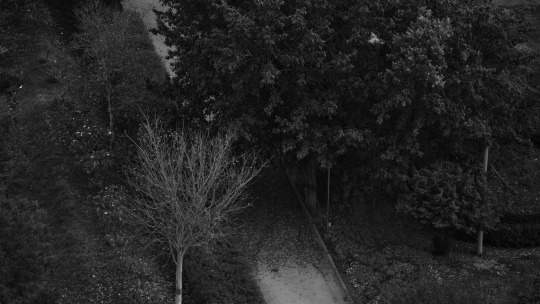
Sometimes, I cannot feel myself under all of this noise. I haven’t been daydreaming lately, but even then my mind does not stop, does not breathe. I catch myself holding my breath. There are days when exhaustion has its lanky fingers around my neck before the sun is even down, before it is even 4pm, and I’ve been waking up late now, but even then at night, I don’t sleep until I hear the sound of my father waking up. I feel beat down, battered down, my body limping like the weakened stem of a plant left without water and sun for too long.
I shut my door and I take naps. I obsess over my work. I balance my phone between my chest and my chin when my father wakes up before I’ve even slept and I’m still not ready to sleep, reading in a dark room with the flashlight on, still not ready to put down the book that holds the bridge between those hours.
The skin on my chest has started to feel paper thin, even as I find my paunch growing bigger with each passing week. I eat only 2 meals a day now. I feel my heart beating through my skin, trying to make some sound. I remember telling a friend that I no longer had anxious thoughts in my mind, only anxious sensations in my body - my clammy hands, a dizzy head, a heart too loud for the body it inhabits, a stomach that could digest iron on some days and cannot hold a buttered toast on other days. I feel my blood thumping against the temple of my head.
I do the dishes at night. Everyone’s home and there isn’t any help, so everyone is helping out with the chores. I do the dishes at night, after everyone’s eaten and slept. While I do the dishes, I plug my ears in and listen to a calm man tell me about ancient Indian philosophy. I could never understand why my mother clings to her Gods until now - these 40 minutes of each day, with my hands covered in soap and water, are the calmest I have felt in a long time, even though it leaves my hands scaly, dry, older. I look forward to this ending but I feel it growing weary, this looking-forward-to.
2 notes
·
View notes
Text
m+n+1
They say we live in a world with 3 spatial dimensions and 1 time dimension, but I’ve always lived in one with 3 spatial dimensions and (1+m+n) time dimensions - m is the number of events that keep replaying over and over in my head, the sweet/bitter scent of those memories fading a little as they move further away from me in time; and n, n is everything that is yet to happen, yet to come, good and bad, sometimes more bad than good.
At any given point in time, I’m having several conversations in my head. It’s like living a simulation of the m+n lives I could have or could have had (has anyone seen Mr. Nobody here?). I find blank spaces everywhere and fill my name in those, just to see how the world shifts underneath my imagination, but I wouldn’t call it imagination anymore. When I say imagination, my mind takes me to a beach - it’s nearly time for sunset, there’s a cooler breeze blowing, and you can hear it, the wind, the waves; and I’m sitting down, in the sand, with my toes stretched out wide, filled with sand, sand with that ticklish sensation, sand with the unimaginable irritation when it refuses to leave your clothes and your body; anyway, and I’m looking over at the horizon, the sea turns warmer, redder; I dig my hands deep into the ground, pulling it closer until the sand starts to stack up. Once it has stacked up, I dig a ditch around the whole thing - because hey, what castle is complete without a moat around it? And I make it bigger, the moat deeper, I take a shell and put it at the top of my creation of this evening.
Imagination, for me, is building sandcastles, but what I do to myself, this constant back-and-forth with 100s of me at different points in time and space, it has no constructive or therapeutic quality, not anymore; and by the end of the day, I find myself unable to get out of it, covered in fatigue, this brain fog that sticks to me, like sand trapped underneath my fingernails.
Isn’t existence at this point just a weighted average of the (1+m+n) experiences of time? What do you think, what happens to that 1 dimension of time distinct from those m+n, the one that exists alongside these 3 spatial dimensions, the thing we call ‘now’?
’Now’ has just become passive - it’s scrolling and scrolling, and “hey, look, this is hilarious”, and “ow, that reminds me of my ex”, and “hey, we should totally go check this out some day” - it’s planning and regretting and mindless entertainment and looking at others who are doing the same thing, compensating for a ‘now’ that is simply too underwhelming for our 5 senses to keep us engaged, and I’m sorry but sharing memes is the digital equivalent of small talk at a boring party where you only came because of the fear of missing out, and you have nothing in common with anyone, so all you can talk about is the guy who is already piss drunk after just one drink - except the party never ends, and the internet is filled with stupid, drunk people. For every one person online using the platform in a way that adds substance to their life, there are a million others who are just jerking it off and scrolling down. If this is our collective ‘now’, what kind of experience are we creating for ourselves? Living life in a certain way so as to capture it and curate these moments - for strangers on the internet to appreciate for 7 seconds, before scrolling lower and forgetting about it forever?
There have been too many days lately when these m+n experiences have been more important than the one, this ‘now’, too many days lately when more hours have been spent on mindless entertainment and scrolling than doing meaningful, fulfilling things; and I guess, I guess that’s a pretty good indicator to make changes.
3 notes
·
View notes
Text
Education & Democracy
Consider a ship. The ship is to undertake a journey - it has to sail through several oceans to reach a land far away. On its way, it will encounter difficult waters, storms even - it is guaranteed to be a difficult journey. Such a voyage requires a skilled captain. In order to determine who should command this ship, a committee of people is going to be established. These people will decide which person is best equipped for this task.
You are the first member of this committee, and you are assigned with the task of recruiting other people for this committee. Note that your task right now is not to choose the captain, but to simply assemble a group of people who will make that decision. Contemplate for a moment - on what basis should this committee be chosen?
The objective of this committee is to choose the best candidate for captain. To do this, we begin by defining a criteria to judge whether a person is a good fit for captain or not. There are, broadly speaking, two categories of concern here.
The first one is technical: what route does the captain plan to take, how does she plan on dealing with storms, etc. The other is not technical: the voyage is not simply about going from point A to point B, it is to ensure that the people onboard are safe and that there is peace and harmony on the ship. For this, we question: is the captain prudent? Is she wise and careful? Is she aggressive? Is she kind?
As average people, it is not possible for us to be experts in each technical aspect - however, in order to judge whether the captain is qualified, it is necessary for at least some of us to possess basic knowledge regarding the technical aspects of sailing.
Now that we’ve established the qualities that we seek in a captain, we can determine the qualities that our committee members must possess.
To judge whether someone has a certain quality, we must possess an understanding of that quality itself. We must understand the benefits of such a quality, and if we seek our captain to have this quality, it must be a good quality, and if it is a good quality, we must ourselves wish to have it. Hence, the people who select the captain must possess the same qualities that they seek in the captain. Our task then boils down to looking for people who possess a subset of the qualities that we wish for the captain to have. Note that if they possess all the qualities that the captain should have, then perhaps they should be captain themselves. Therefore, we restrict our search to people who are strictly less qualified than required for captaincy - they possess certain but not all qualities that are required to become captain.
The people who select the captain, therefore, must be a partial reflection of the captain: the committee must be comprised of people who possess the basics of the technical know-how in order to judge whether the applicant is qualified or not, and also, the values required to judge whether the applicant is the right person to lead and manage the voyage in its non-technical aspects.
* * *
The idea of democracy emerged in ancient Greece. The word comes from ‘demos’ - common people, and ‘kratos’ - strength. Democracy is a Greek concept, and interestingly, one of the strongest criticisms against democracy comes from the founding father of Greek philosophy, Socrates. The story above is simply an extension of the argument that Socrates offered - the ship is the society, the captain is the elected government and the committee of people are the voters.
In a democracy by birthright, each citizen that has attained 18 years of age is allowed to vote. That is to say, each citizen’s opinion is given equal weight in the democratic process. This is equivalent to allowing all the sailors on the boat to be a part of the committee that selects the captain - it is, naturally, ‘equal’, but logically, it guarantees an inefficiency in the outcome of the democratic process - it accounts for the opinion of those who do not possess the skills necessary to make an informed decision. In a highly literate society, this would be a small cost to bear - as long as the majority is capable of critical thinking, the outcome would be efficient, along with the positive side effect of creating a sense of equality amongst the citizens. However, we are not living in a highly ‘literate’ society. Statistically higher literacy rates have failed to account for the limitations of the education.
Education all over the world has been moving further and further away from humanities, closer to natural sciences. Particularly in this part of the world, the education system involves very little amount of compulsory education in philosophy or political science. As jobs in these fields are not economically rewarding, students too lack the incentives to take up these fields or study them. However, what this has created is a society of highly educated illiterates - we understand trigonometry but we do not understand how to reason outside the realm of numbers. Engineering is held in high regard, but political literacy, an education in reasoning, in morality and ethics, it is often dismissed as ‘unnecessary’ for the simple fact that these do not lend themselves very easily to jobs that the capitalist society can absorb. By the virtue of understanding calculus or the laws of motion, one is not naturally equipped to make better decisions. The tools necessary to calculate the trajectory of objects are not the same tools that can be used to differentiate between right and wrong, good and bad - the progress of society has been lopsided.
* * *
“Government of the people, by the people, for the people” - nearly every introduction to the idea of democracy is built around this quote by Abraham Lincoln. It successfully highlights the essence of a democratic institution: people. The people are essentially the engine of a democracy. They participate in the process by adopting different roles: as citizens, journalists, civil servants, political leaders, etc. A democracy works only when all of these perform their functions effectively. Essentially, people are the ground upon which the 4 pillars of a democracy stand.
Our goal, then, becomes to ensure that this ground is firm, that it is fertile, which is to say, to ensure that people are not just well trained but well educated. This is an uncommon belief, in the sense that nobody would rationally disagree with this statement but there are not many people who understand its implications as well as what it demands from us as human beings - it demands a process of constant education - of learning, unlearning and relearning.
The reluctance to devote time and energy to human sciences is a product of several things. The present job market is one of those factors - but then, we don’t do everything just for the sake of work. There is another factor, one that discourages people from moving beyond newspapers and TV and social media - it is the subjectivity.
Society and its functioning does not have a basis in science, at least not in the same sense as the science of the physical world - there are no exact rules that dictate how society works, or how society should work. There are different schools of thought, and each of these lead us on different paths - perhaps, then, there is no objective measure to navigate this space, to understand this world. This belief is only amplified by the environment - the primary source for information in these matters is the news channels, the newspapers. Information has increased, sensationalism has increased, and without being familiar with the fundamentals the govern the debate, we watch news anchors spit over each other, fact after fact, accusation after accusation. With no simple way to understand and to catch up, it seems, the act of being an informed citizen demands far too much these days - how can we be expected to follow the chain of thought and to verify the information being thrown at us, when all of it is happening so quickly? Most people resort to making their own judgements about this information, then, and here too, our judgement is affected by the limits of our knowledge - without a real ‘education’, not just training, but education, our judgement is simply a byproduct of our sentiments - perhaps, this news channel is reliable, or this anchor seems to make sense, or in the past, he has been correct, or his stance is popular. We employ shortcuts in thinking - heuristics - to arrive at what seems to be an approximately correct answer. However, it is far from correct.
Human sciences are subjective, there is no doubt to this - but how subjective? There is no rule, no method that works in every situation - but are there rules that work well in most situations? Is there a way of thinking that can guide us, generally at least, in processing information and understanding society? This is exactly the purpose behind studying history, political science, economics and philosophy. An education in these subjects is essential in developing an understanding of society and participating efficiently in it. People dismiss the study of history - it is true, I gain nothing from learning the exact date that Hitler came to power. However, that is not the true objective of studying history - it is to understand the world that existed before us, so that we can understand how we got here. It is to learn from the mistakes of the past, so that we are not doomed to repeat it. Philosophy, perhaps, receives the strongest criticism - outside academic spaces, it is considered to be a form of intellectual masturbation, with no meaning to be derived from it. Logic is a branch of philosophy that enables us to understand how to reason for ourselves, to determine the validity of a belief, an idea. It is through philosophy that we study ethics, that we learn about morality, the differentiation between right and wrong, good and bad - terms that we encounter every day in our lives, not only in the broader political domain but the personal one too. Yet, most of us receive nearly no formal education in philosophy, and our education in history is limited to learning dates and listing out, in a formulaic manner, the cause and effect of historical events - 8 points for 4 marks, 10 points for 5 marks. To compensate for the lack of critical thinking, some schools have introduced sessions for moral values - to teach kids what is right and what is wrong. Still, the vision is missing - society continues to evolve - the challenges our parents faced are radically different from the ones we face today. It is not enough to teach them what is right and what is wrong - what is necessary is to introduce them to a method through which they can determine this for themselves, for the countless challenges that they will face.
Democracy is flawed because its foundation is flawed: most people are not ‘educated’ in the true sense of being educated - they are highly trained to perform specific jobs. They work as engineers, doctors, businessmen, scientists, designers. The difference between training and education is subtle - but it counts, in every way. Our goal then, to be better people, to be better citizens, involves an education that does not end. It is a pursuit without a fixed answer, and as long as the answer keeps changing, we must keep learning.
3 notes
·
View notes
Text
Kashmir
This piece will attempt to understand the implications of decisions taken by the Government of India in the context of democratic values. We will not attempt to answer any questions - we will only attempt to rationally examine the situation, to see whether the current ruling party has incentives to act reasonably and to do what is good for the citizens of this country.
The Story
On the morning of 5th August, Section 144 was imposed over Kashmir, barring the assembly of five or more people. This was followed by a communication blackout - mobile, internet as well as cable TV services were shut down in the valley.
Following this, the BJP-led Government of India revoked Article 35A and Article 370 of the Indian constitution, which defined India’s relationship with Kashmir, and introduced the bill for the Jammu and Kashmir Reorganisation Act, splitting the state into two separate union territories.
The Government
Any decision can be evaluated on the basis of two factors: the intention, and the impact. Moreover, the impact itself is not independent of the intention - it depends upon the policies created and their implementation, which in turn, are dependent upon the intentions behind a particular decision. Consequently, it becomes important to evaluate, what is the precise intention behind this decision?
Intentions are twofold: those that are clearly stated, and those that aren’t. The BJP clearly stated some: it justified its stance by claiming that Article 370 has been a hurdle to development in the region, that it has enabled corruption in the region and promoted terrorism. However, this is not the full story. In order to infer what has been left unsaid, it is important to understand the dynamics of the political parties that contest elections to form governments.
Ideally, in a democracy, the government has one objective: to promote general welfare. Even as they adopt different paths to attain this, the objective itself does not change. On the other hand, politics is different - it begins with the same objective - of making change and contributing to the society. However, in order to make any change, you need authority and power, which can only be gained by competing with the other political parties in the country. Competition is a double-edged sword - economics lends itself to political science here - more competition is better, because each party will have to prove itself to be better in order to win the elections. What this ignores is the irrationality of the voters - what is the criteria for a party to be ‘better’?
Under this, the public sentiment and opinion dominates. The mobilization of nationalist sentiment becomes a powerful political tool. It is the public sentiment that eventually determines the result of the elections and hence, determines the party which comes to power, more so than the policies or the values of a party.
For any political party to matter, to make a difference, it needs power. Everything else comes later. Consequently, the primary motive of any party on the political spectrum can be boiled down to this: to come into power and retain it. This is not to say that all politicians are simply power hungry, but to be conscious of the fact that power is the currency which governs this system. Without power, the policies and ideas remain just policies and ideas. With power, you can shape the future.
It is evident from the above that the government has a different objective than the political parties. While governments attempt to maximize welfare, political parties attempt to maximize political power, which does not necessarily lead to higher welfare. To stay in power, they must mobilize popular support - they are disincentivized from making decisions that would not be taken well by the public. They may opt to make a decision that is, ethically and logically, ‘bad’ for our society, only on the basis that the majority of the people would support it. This is only to demonstrate the fact that the political parties have more incentive to do that which is popular, as compared to that which is unpopular but possibly better.
This reveals the dual identity of the ruling party: firstly, that of the government, to promote the general welfare in the country, and secondly, that of a political party that is due for elections within the next 5 years. In a truly rational setting, these two goals could be achieved in harmony, so much so that the goal of promoting the welfare of the people would in itself lead to the achievement of mobilizing popular support. However, in the real world, the irrational world, there is another possibility - one where, by mobilizing popular support and invoking nationalist sentiments, the ruling party convinces the public that its actions are indeed for the welfare of the people. Note the difference carefully in the two cases: in a truly rational world, the starting point is welfare, the incentive is welfare and the popularity comes as a natural consequence of good governance. In the real world, a possibility is that the starting point is to ensure public support, the incentive is the power that comes with it, and the welfare of the people need not actually be a concern, so long as the people are convinced with the illusion that whatever the government is doing, it is in their best interests. In such a case, it is simply sufficient to convince the people that whatever is happening, it is for their own good - and here, there is incentive to distort information, to discourage dissent, to use ‘security purposes’ to silence, detain and arrest anybody who may as much as bring up the idea that the government may not have the best interests of the people at its heart - there is incentive to create a narrative that promotes the correctness of the government in absolutes, and that is where the death of democracy lies.
It’s important to understand what incentive means. Incentive is essentially motivation. When we say that somebody has incentive to do something, it means that they are motivated to do so, that it is in their self-interest to do so. Your acceptance or rejection of the above paragraph regarding the incentives of the government is simply based on your sentiments regarding the current ruling party - if you truly believe that the current government would do what is right for our country, even at the risk of losing popular approval, thereby losing the next elections, then you are likely to reject what is being proposed above. However, if you believe that the decisions of the current government would be guided by its need to retain popular support and please its vote-bank, then perhaps, you will agree. We leave it up to the reader to make his/her own inference regarding this.
So far, we’ve analyzed the government. Only possibilities and incentives have been presented, no objective conclusion can be drawn yet. Now we move on to the system of checks and balances in place that protect the democratic foundation of a country and we look at this in the context of Kashmir.
The Fourth Estate
There are 3 pillars of democracy - legislature, executive and judiciary. The fourth estate refers to the press and news media - it is the pillar that completes the foundation of a democratic society.
The journalists are observers of the political process, with one and only one objective: to ensure that the participants do not exploit the democratic system. This is such a vague objective that we must specify the part which is relevant for us.
The democratic society is based on participation of the people. Initially, there existed ‘direct’ democracy - one where every citizen of the country has a say in what is happening. As populations exploded, this became impossible, so we moved to a model of indirect democracy, where we elect people to represent us in the democratic process. While this creates convenience, it also creates a gap between the people and their representatives - the media is essentially the bridge for this gap, it is what amplifies the voice of the public to ensure that it reaches our representatives.
Moreover, we have seen that governments have incentive to do that which is popular. Equivalent to this statement is another statement - governments have incentive to ensure that whatever they do, they present the positive side of it. Keep in mind, the end result for a political party is to mobilize public support - this can be done either by doing what the public wants, or doing something that the public feels is correct. Note that there is no place for good or bad, right or wrong in this. Under this framework, right/good decisions may be taken, but if they are, they will only be a consequence of doing what pleases the people.
Since the government has incentive to present only the positives of any decision and action, it brings us to understand the need for the opposition as well as the journalists: to criticize, at each step, what the government does. Dissent in our society has been reduced to a bad word - there is nothing bad about dissent. Without dissent, without opposition, without criticism, democracy cannot exist, and it is here where the journalist serves the most important role - this must not be equated with ‘anti-nationalism’ or ‘creating unrest’ - without debate and dissent, democracy cannot exist.
Moreover, power is strongly associated with corruption. It is not so much that power breeds corruption, it is that it amplifies corrupt human tendencies. We are not stating that all authorities are corrupt, but that all authorities have power, and power tends to amplify our corrupt tendencies. It is the role of the journalists to counter this imbalance - through investigative reporting, by creating awareness and reaching out to the people, by being whistleblowers when necessary, the authorities are prevented from abusing their powers, which, if left unchecked, can be catastrophic.
However, journalists have limitations too - dissent comes at the cost of being under constant threat, at the disapproval of the authorities that are in power presently, and in our society, at the possibility of being labeled ‘anti-national’ for the simple act of presenting an alternate view. These social disincentives affect the behavior of journalists too, giving them incentive to keep shut.
On the other hand, under the conditions of competition, media houses have certain incentives: they have motivation to sensationalize news and events, to be controversial for the sake of being controversial. In order to turn profits, they must attract viewers, and while this goes strongly against the ethics of journalism, there are economic incentives to engage in such behavior.
The Questions
Keeping all of the above in mind, we would like to ask you to think about the following things:
How does one react to the idea that Indian officials as well as media houses have reported peace in Kashmir whereas BBC, Reuters and others have reported protests with over 10,000 people? Which of these have incentives to paint a false picture of what’s happening in Kashmir, if any?
How does one react to the idea that Kashmir remains under absolute communications and information blackout presently (9 days and counting), with highly restricted flow of information in the valley? Without internet, without mobile phones, without landlines and cable TV in Kashmir, when the Indian government states that there is peace in the valley, that Kashmiri people are celebrating with us, what can we infer? What can we say about the Indian government? What can we say about the Kashmiris?
How does one react to the idea that Kashmiris have been left out of the process entirely, and with the communication and information blackout along with imposition of curfew-like conditions under Section 144, they are not allowed to express their views either? Additionally, how does one react to the detention of political leaders in Kashmir? What can we infer about the democratic process in Kashmir in the context of the current situation?
How does one react to the claims of the current government that the decision has been made keeping in mind the objective of development in the region? How do we account for the claim that this might be a move by the government to change the demographic makeup of the region, to get rid of the Muslim majority in the state? How do we reconcile the difference in claims of the government with the national statistics that prove Kashmir is not as backwards as claimed? Do the statistics truly reflect development in Kashmir or do the numbers fail to account for other non-quantitative factors?
We leave it to the readers to infer the answers to these questions, keeping in mind the context and incentives for each agent involved in this event.
Those in power have the incentives as well as tools necessary to distort information. The point of writing all of this was not to establish a certain version of truth to be absolute, but to demonstrate the thinking with which we must approach such situations, as individuals.
Conclusion
There are facts and there are counter-facts - in a post modernist society, the elusive truth escapes us. India right now is bleeding, it is bleeding two shades of the same color - we bleed red for Kashmir, and we bleed saffron for a new India, one without the open wounds of Kashmir. The idea behind this post is not to convince you to take a particular stance - it is only to elaborate on a particular way of thinking, to demonstrate why, even if the truth is out of reach, even if we are surrounded by confusion, we must be willing to block out the noise and think for ourselves, to question the intentions of those in power, and to think. Several questions have been left unanswered for the simple fact that we acknowledge the limitations in our knowledge - even in the above analysis, there are surely missing pieces. No claim is made regarding this being a holistic model of understanding what is happening today, only one way of looking at it and analyzing it.
1 note
·
View note
Text
Why Write?
Writing, to most of us, is not an enjoyable activity. It is not something that we do on a regular basis - sure, we use language to communicate, and most of us write for work, for education, and some of us, for art too. But other than these highly specialized applications, what is the point of writing? Really, the natural question arises - is there anything that the average person stands to gain from writing?
I’m in no position to develop some theory about this, neither do I have statistics to back my claims. What I do have is a bit of experience - I’ve been writing, more or less, for the past 11 years - In the form of journals, in the form of letters (love, and hate), in the form of plans (for work and for myself), and so on. Of course, most of these words never saw the light of the day - they were never meant to.
Why, then, write? For myself, of course.
I’ve used writing as a way to understand ideas and situations that are simply too layered, too complicated to be dealt with otherwise. For me, writing works well as a condenser - when I attempt to convert a thought to words, I must improve my understanding of it - it forces me to simplify where I can, to seek the very basic definitions of things, to find the underlying assumptions and relationships that are often unstated. Many people would consider a process like this to be too ‘abstract’ - of course, most of life is not reducible this way, but I was never here to create a science - I was only here to understand things better, approximately.
In my personal life as well, writing has served an important purpose. In the most turbulent periods of my life, I have journaled extensively - I have written about myself rigorously, often using the process to step out of my mind and be an observer to my own thoughts and feelings. In a lot of ways, writing has served a meditative purpose. I have used writing as a dumpster too - to vent anger, sadness, feelings and thoughts that I was never comfortable sharing with anyone around me, I have confessed to the pages of a notebook I keep safer than my wallet. Whenever I felt emotionally overwhelmed, I would experience something that I describe as ‘brain fog’ - there would be an impenetrable layer between me and the rest of my world. Things that I normally enjoyed would become less fun - because my mind was so occupied with everything else, I struggled to be present to life around me. Writing helped with that the most - as the words came out, they felt meaningless, hollow, angry and lame. But later, in those same words, I could see the state of my mind - disturbed, chaotic, jumpy. I started to see what was wrong. I started to see where it was coming from. And now, I could finally fix it.
Words have done something unexpected for me - they are a mirror that reflect what lies beneath the surface. I struggle to write - not because I lack the language required for it, but because I am scared. I am scared of being imperfect, I am scared of saying the wrong thing, I am scared of not being good enough. Perhaps I feel that I don’t have anything worth saying. Words have shown me that I don’t write about love, even though I think about it so much - perhaps I think a little less of myself for writing about what seems to be a cliche. I try to write as little as I can, but still, there is so much on my mind.
And so I ponder, endlessly sometimes, upon each word, censoring myself, making my mind more palatable for those around me. Writing has shown me my tendency to hide - I have always thought of myself as ‘shy’ but now I can see, I have really just been trying to squeeze into the smallest space possible and to attract as little attention as possible because I’m just scared and unsure of myself.
Writing has become an essential part of my thought process - I think as much in my head as I do on the paper. Only, now I don’t carry the burden of remembering everything at all times.
//This post was written as part of the 200 Words/Day #HeadToPen challenge by The Outgrowers. The idea is to get at least 200 words out each day, regardless of what you write about. The Outgrowers is an initiative undertaken by my friend Prashant and I, to create a community centered around self-improvement and wholesome growth - in every sense of the word.
5 notes
·
View notes
Photo
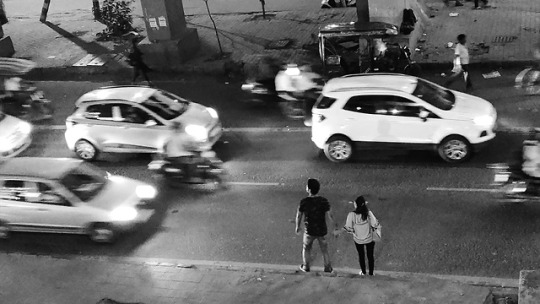
Nights, I’ve realized, are precious, more so than any hour of the day. At first, there wasn’t much to them - and then, I found books. I remember staying up late in the winter, when school was off, a story in my hand, legs crossed to preserve heat - the blanket was too large, too heavy for me to just drag around. I’d stay up till 3, 4, sometimes shivering from cold, reading, with my parents occasionally getting up in the night and telling me, loudly, to go to bed.
—
Nights, I’ve realized, are another world. At first, there wasn’t much to them - and then, I found someone I love. I remember staying up late in the winter, even when school was on, my phone in my hand, my head under the blanket, giggling, giggling - oh, love. We became somebody else though - like insects, shedding their skins, we were somebody else at night, with no inhibitions, with wild dreams, unlimited, boundless, places to go, things to do, bucket lists to make, like characters in a film, like characters in a book, except we wrote for ourselves, about ourselves, every night, sometimes together too.
—
Nights, I’ve realized, are destructive, more so than any hour of the day. At first, there wasn’t much to them - and then, just as the love came, with its burning passion and fantasy-like imagination, so did the anger - words like knives, like lasers, precise, targeted exactly where it hurts the most. We ripped each other apart, slowly, steadily, edging towards a kind of insanity that is hard to describe - you start, and its a nice conversation, and then someone says something, and it triggers an avalanche, and before you know it, everyone’s rolling down the hill. It’s 2am and the crying and the fighting won’t stop. It’s 4am and you can barely remember what you said a minute ago, trailing off mid-sentence because your mind no longer works. The anger and the hurt, it has filled each vein, each artery. You sleep like that, you wake up only to continue it, and the night blends into the day, and all the days, they start to blend together. One fight after another, one night after another.
—
Nights, I’ve realized, are for myself. Someone told me, the couple inches inside my head, that’s my space, all mine. Nights, I’ve realized, is when those 2 inches tend to take over me entirely. The filter disappears, and each thought, each emotion, it’s amplified, so loud, I can barely keep track. Each fear becomes real, and I find myself sad over things that aren't, things that won't. The possibility of love, it becomes so real, I find myself burning red, a smile plastered on it, aching. All the doubts, my darkest thoughts, things I have buried under layers of other buried things, they start to push upwards, leaking through the seabed of this world I have built for myself. I become ‘that guy’, the one I fear becoming. Everything I despise about this world, I begin to see in myself; I am a cheater, I am a liar, I am shallow, I am hollow, I am judgmental, I am boring, I will never amount to anything, I will never be enough... – the haunting echo goes on, so familiar but something I will never get used to.
—
Nights, I’ve realized, are when I am at crossroads. It’s often the time when I pass on from being one to being another. Like the ship of Theseus, I’m never sure whether I wake up the same person I was the night before.
3 notes
·
View notes
